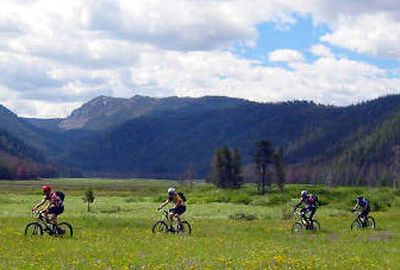Mountain bikers, wilderness plans collide

BOISE – From the Fourth of July Lake trail, mountain bikers catch some of the widest views of the comb-like peaks of the Boulder-White Cloud Mountains, but only if they can take their eyes off the wrist-twisting shale as the trail cuts across the picturesque alpine basin.
Yet, to the dismay of fat-tire aficionados, bikes would be barred from Fourth of July and 85 miles of other nearby singletrack – the narrow, challenging trails prized by hard-core riders – under a bill gaining steam in Congress.
The Central Idaho Economic Development and Recreation Act, sponsored by Rep. Mike Simpson, R-Idaho, pegs 492 square miles near the famed Sun Valley Resort as federally designated wilderness.
It’s a vexing paradox for the International Mountain Bike Association, whose mission largely is to preserve trails in wild areas across the country. Since the 1980s, the legal definition of wilderness has prohibited mechanized transportation like snowmobiles, all terrain vehicles and – inexplicably to some – mountain bikes.
So now, the association finds itself battling wilderness bills and tangling with conservationists in Idaho, California, Montana and the corridors of Congress.
“We love wild places, that’s what brings us to mountain biking,” said Mark Eller, a spokesman for the group. “It’s really a double-edged sword for us.”
In Idaho, the group has split with its sometime allies, the Idaho Conservation League and the Wilderness Society. A call-to-action alert sent to members urges a letter-writing campaign against defining the Boulder-White Clouds as wilderness.
But across the border, the group is lauding a measure to protect wilderness around Oregon’s Mount Hood. That bill’s authors – Rep. Earl Blumenauer, D-Ore., founder of the Congressional Bike Caucus, and Rep. Greg Walden, R-Ore. – adjusted wilderness boundaries to exclude popular biking trails.
A measure that would lock in 468 square miles of the northern California coast as wilderness has rankled mountain bikers, while advocates are asking lawmakers to support a cycle-friendly wilderness bill in Virginia.
The group is unlikely to mount a legal challenge against the wilderness definition, Eller said. Rather, mountain bikers will argue for land designations more inviting to cyclists, such as national conservation areas.
Another tactic is to press heavyweight conservation groups to pitch a bigger wilderness tent – one with enough space for mountain bikers, said Chris Cook, an IMBA representative in Idaho who drapes a “Keep Mountain Bikes in the Boulder-White Clouds” banner from his car’s roof rack.
“Many people who run environmental organizations are older in age and they have a misconceived perception because they’ve never ridden a mountain bike before,” he said. “But the tide will turn as more people realize that just because we have two wheels, we’re not dirt bikes.”
The legal definition laid out in the Wilderness Act of 1964 predates mountain bikes. The Forest Service interpreted the law to bar mountain bikes in the 1980s after cyclists invented the new vehicle with fat tires and beefy shock absorbers, capable of wheeling over new and wild terrain.
Many conservation groups are unlikely to welcome mountain bikers into the wilderness any time soon, said Michael Anderson, an attorney for the Wilderness Society in Seattle.
The argument against bikers is not based on environmental concerns – some studies have shown mountain bikes cause no more damage to ecosystems than backpackers, while horses, which are allowed in wilderness, are far more harmful – but on purity.
“You could have a million hikers going into an area and causing more damage than one snowmobile. We’re not talking about that,” he said. “It’s that the Wilderness Act provides for a primitive experience and solitude, an undisturbed type of recreation.”